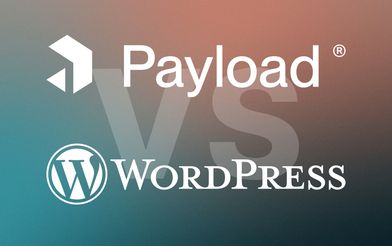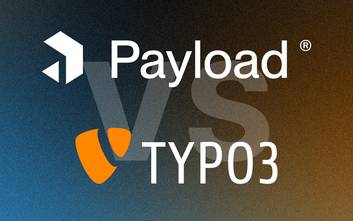
Payload CMS vs WordPress comparison
In the following article, we will compare Payload CMS and WordPress. We will explore the features, benefits, and use cases of each CMS.
The first part contains general information about both CMSs. The second part provides a direct comparison between Payload CMS and WordPress.
About Payload CMS
Payload CMS is an open source headless CMS that is designed to be flexible, powerful, and easy to use. It is built with modern technologies and is designed to be a great fit for a wide range of projects. It allows for complex role and rights management to control user access rights and supports multilanguage as well as SEO features.
Short Facts about Payload CMS
-
Open Source
Payload CMS is open source and free to use. It is licensed under the MIT license. -
API First
Payload CMS is designed with an API-first approach, making it easy to integrate with other services and applications like Webapps, Mobile Apps, and more. -
Multilanguage
Payload CMS supports multilanguage content out of the box, making it easy to create and manage content in multiple languages. -
Role and Rights Management
Payload CMS allows for complex role and rights management to control user access rights. From records to individual fields and logic, everything can be controlled. -
Programming Language: TypeScript
Payload CMS is built with TypeScript, a statically typed superset of JavaScript, which allows for a more robust and maintainable codebase than non-typed languages.
About WordPress
WordPress is the most used Content-Management-System (CMS) in the world. It's popularity has been achieved through its easy installation and plugins that allow to create websites even partially without programming knowledge. This brings a lot of disadvantages with it, as the use of plugins relies on third-party code, which can affect security and performance. It's newest Editor is based on the framework React, used in the backend, which can be confusing for developers since they have to work with multiple programming languages. By default, WordPress has a very simple role and rights system and multilanguage is also only effectively possible through plugins.
Short Facts about WordPress
-
Open Source
WordPress is open source and free to use. It is licensed under the MIT license. -
Most used CMS
WordPress is the most used CMS in the world. -
Plugin Dependent
WordPress relies heavily on plugins (e.g. for SEO, multilanguage, etc.), which can have a negative impact on security and performance. -
Community
WordPress has a large and active community of developers and users. -
Multisite
WordPress has a multisite feature that allows you to run multiple websites using the same WordPress installation. -
Role and Rights System
WordPress has only a simple role and rights system that allows you to control what users can and cannot do on your website. -
Programming Language: PHP (and partly with the framework React)
WordPress is based on PHP, a slighly outdated server-side scripting language. For it's native Editor, WordPress uses React but only in the backend, which can be confusing for developers.
Direct Comparison Between Payload CMS and WordPress
Payload CMS and WordPress are two very different content management systems in terms of their architecture. WordPress has been on the market for years and has therefore been able to establish itself over time. Payload CMS, on the other hand, is a modern headless CMS based on TypeScript. Being relatively new, it is not as widespread as WordPress.
Costs and Use Cases
WordPress has the advantage that it can be installed with almost any web hosting package. The installation and setup are very easy and quick to complete. Due to the multitude of plugins, WordPress can be used for many different use cases. However, costs can rise quickly, as the maintenance and care of WordPress can be very labor-intensive. Developing custom applications can be very time-consuming and complex.
Payload, on the other hand, offers a simple and intuitive user and developer experience, enabling content to be created and managed quickly and easily. Payload CMS also offers a variety of features that allow for the creation of custom applications tailored to specific requirements.
Developer DX
Payload CMS is a modern headless CMS based on TypeScript. It offers a simple and intuitive API, enabling developers to quickly and easily create and manage content. Payload CMS also provides a variety of features that allow developers to create custom applications tailored to their specific requirements.
On the other hand, WordPress is a traditional CMS based on the older programming language PHP. The necessity of using plugins can make the development of custom applications in WordPress very time-consuming and complex.
Conclusion
While WordPress can be set up quickly and easily with its simple installation and multitude of plugins, one quickly becomes dependent on third-party code and plugins, which can lead to security and performance issues. For those who only want to run a simple website or blog, WordPress is a good choice, as it runs on almost any web hosting package.
For professional and scalable projects, Payload CMS is generally the better choice, as it is based on TypeScript and thus uses modern and future-proof technology. Since Payload supports multilingualism and more granular rights management natively, it quickly becomes the better choice for both smaller and larger projects.
Many problems that are solved by plugins in WordPress can be implemented in a short time with Payload CMS. The costs saved in system maintenance and care, along with the advantage of being able to seamlessly expand and scale the system in the future, make it a preferred option.
Further Information
Payload CMS Website
WordPress Website
CMS Comparison
The following Table compares features between popular CMSs. Not every feature is relevant for every project, so choose the CMS that best fits your needs.
For me personally, Payload CMS is the best choice for most projects. It is open source, allows for a quick setup, has a great developer experience, and is actively maintained, even though it is a relatively new player in the CMS space and therefore has a smaller community.
| Feature | Payload CMS | TYPO3 | Wordpress | Drupal | Strapi | Contentful |
|---|---|---|---|---|---|---|
| Open Source Free to use and modify | Excellent | Excellent | Excellent | Excellent | Average | Not rated |
| Native Multilanguage Support Built-in support for multilingual websites | Excellent | Excellent | Poor | Excellent | Excellent | Excellent |
| Detailed Role-based Access Control Granular control over user permissions and roles | Excellent | Excellent | Poor | Average | Poor | Excellent |
| Built-in SEO Features Built-in features to optimize websites for search engines | Excellent | Average | Average | Average | Average | Average |
| Native Front End Rendering Frontend can be rendered by the CMS itself | Excellent | Excellent | Excellent | Excellent | Not rated | Not rated |
| Headless/Decoupled Architecture Possible Backend does not necessarily dictate the frontend technology | Excellent | Not rated | Poor | Poor | Excellent | Excellent |
| Fully Typed between Frontend and Backend Frontend knows what to expect from the backend and vice versa | Excellent | Not rated | Poor | Not rated | Excellent | Excellent |
| Consistent Backend UI Backend UI is consistent and easy to use across different installation and configurations | Excellent | Average | Poor | Excellent | Excellent | Excellent |
| Fast Backend Loading Times (SPA) Backend is a single page application for fast loading times | Excellent | Not rated | Not rated | Not rated | Excellent | Excellent |
| Extended Community Support Active community of developers and users | Average | Average | Excellent | Average | Average | Average |
| Total Points | 29 | 18 | 16 | 19 | 22 | 22 |
Comments
More posts in Development

Learn how to setup Nuxt 3 and 4 with Lucia Auth and Artic Social Login with Prisma in 2025.

Learn the differences between Payload CMS and TYPO3. Explore the features, benefits, and use cases of each CMS.

Check if Element is in Viewport and gets scrolled distance in percentage.